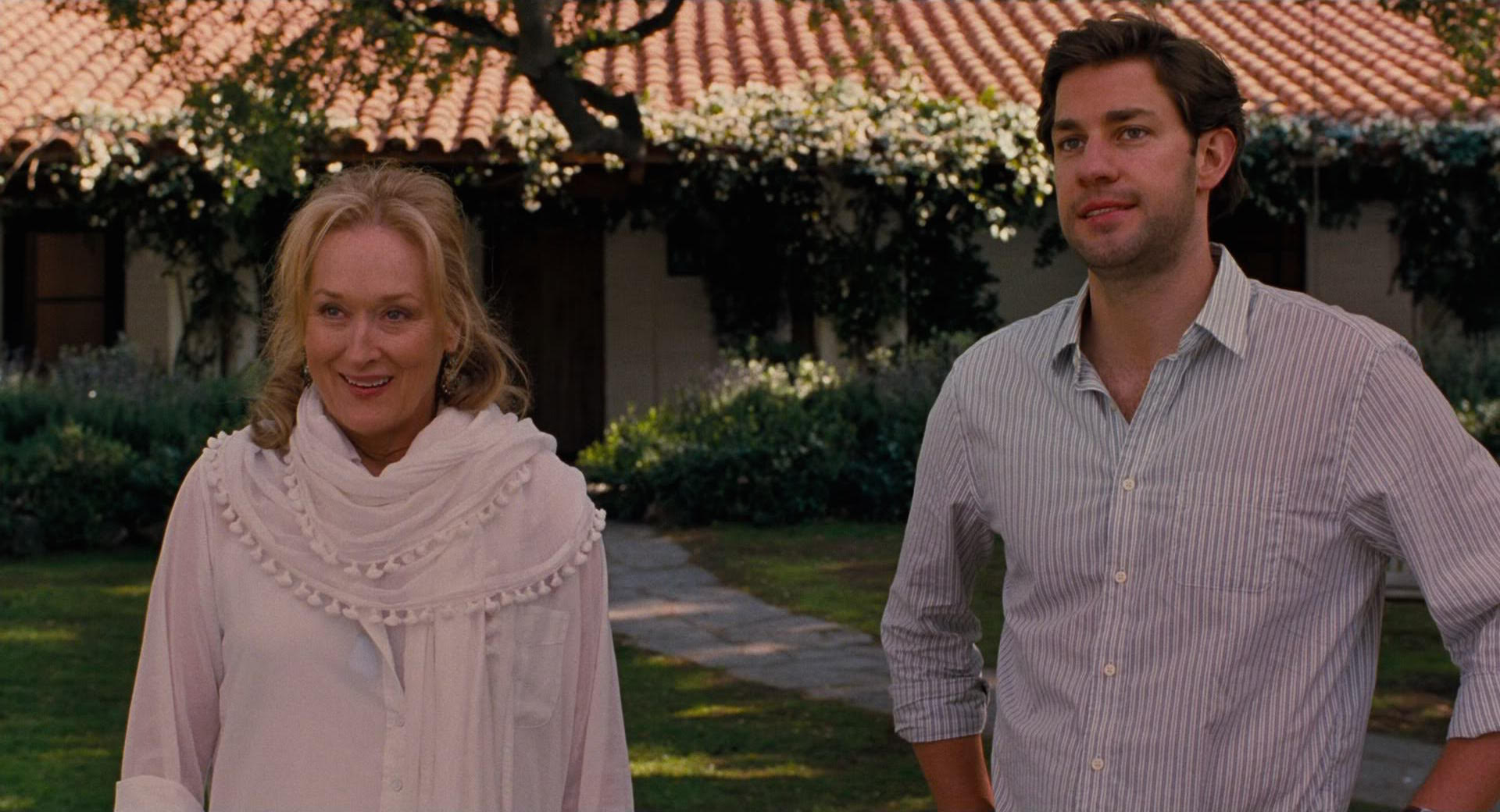John and Matthew are watching every single live-action film starring Meryl Streep.
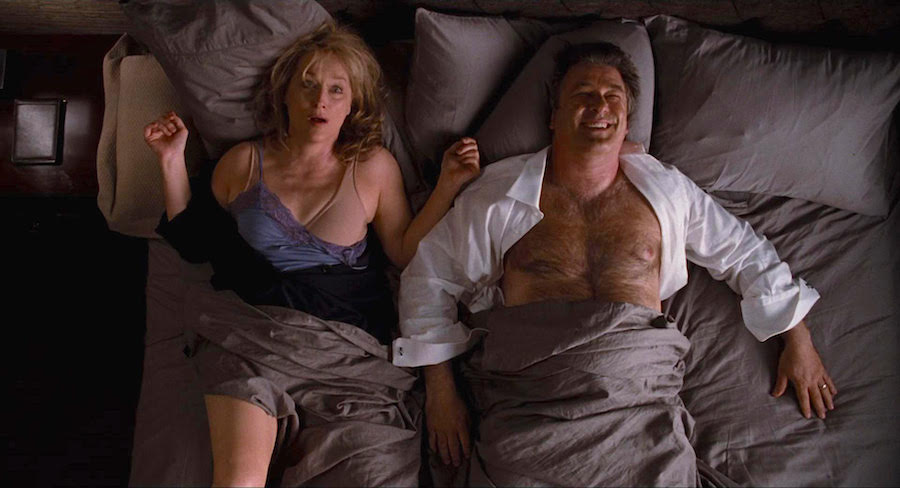
#42 —Jane Adler, a successful bakery owner caught in a love triangle with her ex-husband and her architect.
JOHN: Quick: name a recent American movie starring a 60-year-old woman who, in attempting to enliven her long-deferred sex life, is pursued by not one but two enamored men. Additionally: name a film like this that grossed over $200 million worldwide. Perhaps the only correct answer is Nancy Meyers’ It’s Complicated, which is itself a testament to both the rarified and barrier-breaking career of its leading lady, the one and only Meryl Streep. “Only” because, well, who else but Streep could get a movie like this off the ground and steward it toward a box office tier reserved almost exclusively for inane, teenager-courting blockbusters? In her 2011 Vogue cover story, Streep remarked that “in the period of Silkwood, [It’s Complicated] could never have been made, with a 60-year-old actress deciding between her ex-husband and another man. With a 40-year-old actress it would never have been made.” It’s Complicated is a star vehicle that is in some ways completely uncomplicated, but in other ways downright revolutionary, showcasing the effervescent charisma of its beloved star while also demanding that audiences consider a woman who undoubtedly exists in the real world but hardly ever graces the big screen...
After letting loose in films like Mamma Mia!, Julie & Julia, and, in some respects, Doubt, Streep dials back the histrionics and digs deep into uncovering the emotional turmoil of Jane Adler, a thriving pastry chef and small-business owner who allows herself to have an affair with her boisterous ex-husband Jake (Alec Baldwin) while simultaneously entertaining the more tempered advances of her architect Adam (Steve Martin).
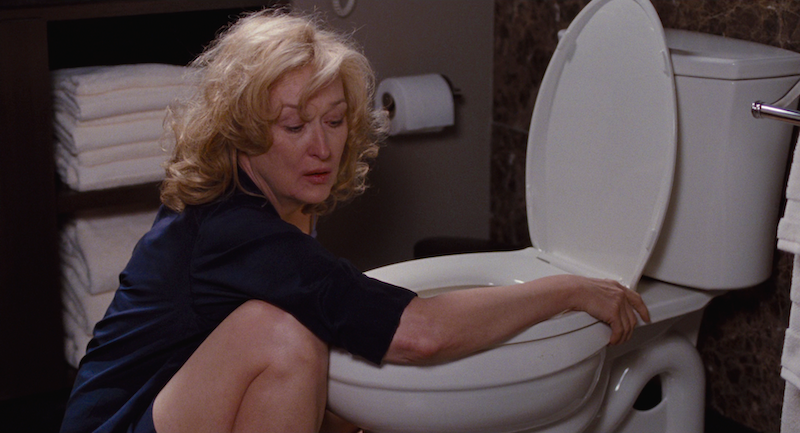
Guided by an able director who completely understands that her leading lady is, at heart, an entertainer, Streep creates a comic performance full of indelible expressions and hilarious line readings that nonetheless remains grounded in reality, or, rather, the reality of a very well-off Santa Barbara resident. Streep’s Jane is the type of woman who can tryst with her ex-husband on a weekday morning at a posh hotel and escort the architect of her new kitchen extension (!) to her own Dean & DeLuca-style restaurant to make delicious chocolate croissants in the middle of the night. Streep is, let’s be clear, not playing an “ordinary” woman, but she does manage to telegraph the specific concerns and dilemmas of upper-middle-class women of a certain age: the empty nest, the sagging eyebrow, the unsatisfied nights spent alone.
From the moment Streep first appears onscreen she is laughing, and for most of the film we are laughing along with her. Sprinting out of a plastic surgeon's office, staring with eyes aghast at the thought of her vagina “closing up,” laying in bed beside Baldwin in post-coital horror, only to waddle over to the bathroom to vomit, Streep ensures that the film is laugh-out-loud funny, all while navigating tricky dramatic situations between her two paramours and confronting hard truths about her current predicament. Slouched over the toilet after rekindling her flame with Baldwin, Streep utters, “This is the stupidest thing two people have ever done,” with complete sincerity.
Streep must constantly negotiate the highs (ravenous sex, life-long familiarity) and lows (confusion, chaos, adultery) of her affair with Baldwin while hiding it from her brood (played by Caitlin Fitzgerald, Zoe Kazan, and Hunter Parrish), who remain oblivious to signs of their divorced parents’ illicit engagements, even as Jane’s future son-in-law (John Krasinski) picks up their scent. Martin further complicates this by being completely available and kind, playing a slightly reserved man who nonetheless invites Streep to experiment with a different type of adult relationship as exciting as it is comfortable. Meyers allows Streep the time and space to deliberate between these two men, and Streep rewards her with a protagonist whose rich inner-life lends weight and integrity to what could have easily been a cartoonish farce. There’s so much to savor here, but what jumps out at you the most about Streep’s Jane Adler?

MATTHEW: Baldwin has a line early on in It’s Complicated that summarizes what’s so special about Streep’s performance here, her best of 2009. “You were great — so loose and sexy,” Baldwin remarks to Streep after one of their early assignations, before asking, “How often do you get to be like that?” Yes, Baldwin’s character is referring with proud lechery to the extramarital sex he just had, but it’s a comment that could be applied with equal validity to Streep’s stellar work across this film. It’s Complicated showcases one of the actress’ saddest, sweetest, and thirstiest performances, a near-constant joy from beginning to end that is made all the more pleasurable for the very rarity of this kind of acting assignment in Streep’s career. In recent years, I have watched with no small bittersweetness as international actresses like Paulina García, Isabelle Huppert, and Juliette Binoche have boldly dug into similar roles as heartsick yet courageous divorcées in, respectively, Sebastián Lelio’s Gloria, Mia Hansen-Løve’s Things to Come, and Claire Denis’ Let the Sunshine In. I take obvious delight in these wise and winsome performances, but I also sorrow over the fact that older American actresses like Streep and Angela Bassett and Annette Bening and Patricia Clarkson and Holly Hunter and Jessica Lange and Alfre Woodard, among many others, are seldom given the chance to headline stories so human-scaled and root around in the dramatically rich lives of everyday women about whom Hollywood could not possibly care less.
With the possible exception of the underrated Hope Springs three years after it, It’s Complicated is the closest we have yet to come to seeing Streep in a grounded, semi-soul-bearing character portrait like the ones cited above, even if the most inspired moments of Meyers’ film hardly hold a candle to Lelio’s, Hansen-Løve’s, and Denis’ tougher-minded studies. I truly admire Meyers’ comedic sensibility and visual flair, but her baggy, oftentimes scatterbrained films require hardworking and emotionally astute actors like Streep, Diane Keaton, Anne Hathaway, and the rest to keep her narratives hanging together. Here, Meyers’ disorganization has the benefit of giving Streep ample room for variation, and the actress embraces these opportunities wholeheartedly. Sure, she still has to suffer through some of Meyers’ sillier scenarios, like that pandering plastic surgery scene or Jane’s later, gratuitous visit to the therapist that literalizes all the inner turmoil that Streep has made palpably plain elsewhere. Yet it’s easy to forgive and forget moments like these because of the scene-improving specificity of Streep’s merrily authentic approach, which lends credence to each and every shift in the character, no matter the sloppiness of Meyers’ transitions.
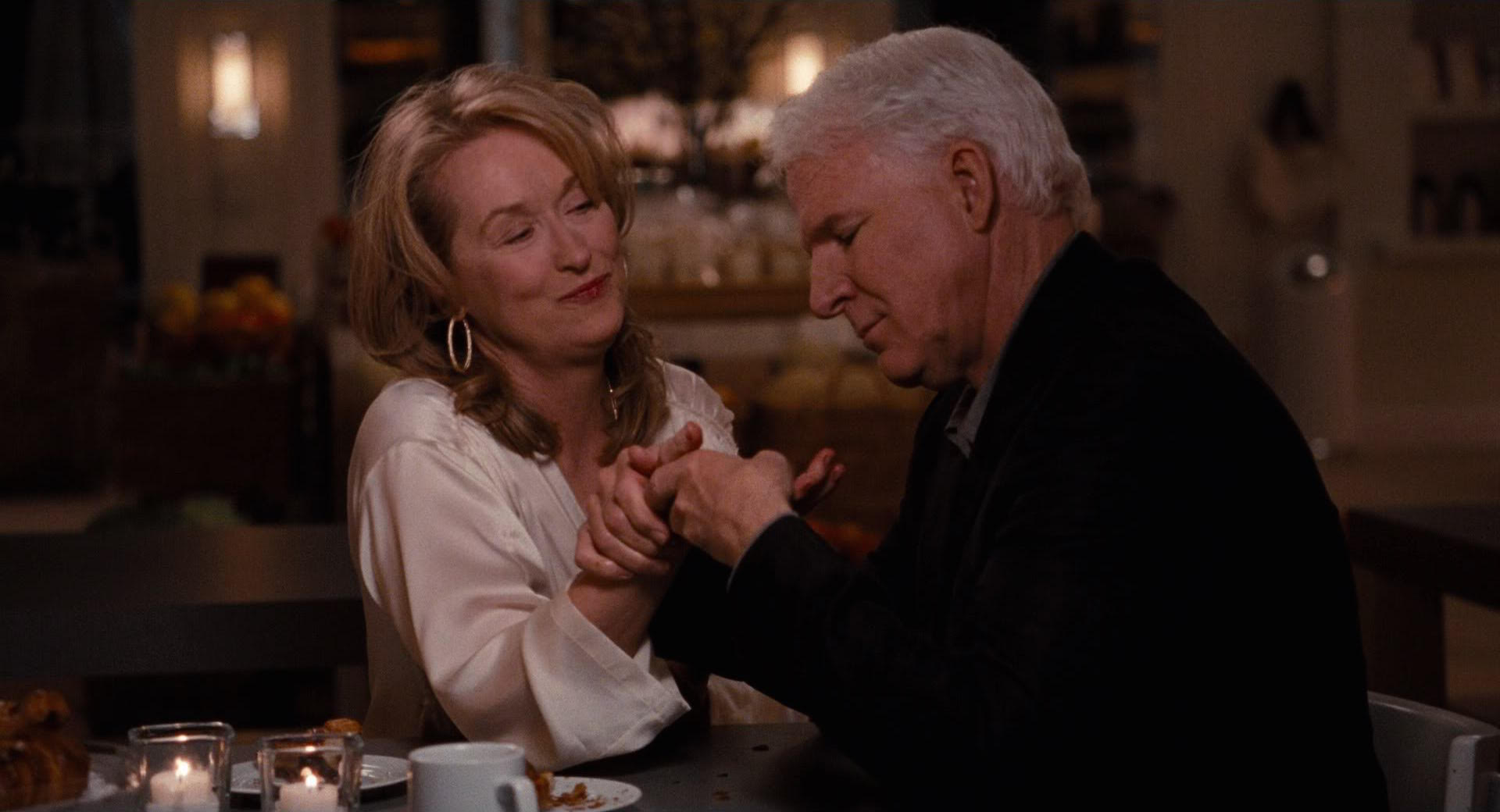
In It’s Complicated, Streep radiantly masters the art of playing flustered without being fussy. No matter the set-up, Streep’s aim is sharp, her intent always clear and true. There’s real fire in her flirtations and bedroom scenes with the especially game Baldwin, but there’s also real ice in her eyes whenever Jake drudges up old slights and unhealed wounds from his and Jane’s marital past. In studio comedies, moments like these frequently translate as screenwriters biding their characters’ time with some empty quarreling before they face their next comedic obstacle. But Streep seizes these passages to show us the conflicted consideration of a woman wondering if she really can just resume a former life she assumed she had long left behind. That’s a more complex interpretation than most actors can snatch from an entire script, much less a scene that is essentially dramatic filler. Similarly, Streep maintains a wonderfully warm rapport with Martin while showing particular skillfulness in not immediately deepening their connection, purposely keeping Adam at a distance as Jane throws herself back into her relationship with Jake. Streep is as attuned as ever to her fellow actors, but she’s also clearly working through the complex impulses of her character, never coming to the pat conclusions one might reasonably expect from this genre or this filmmaker.
In 2009, the Academy’s acting branch unsurprisingly went for the Streep performance most in keeping with their penchant for wigs and accents. But It’s Complicated, in retrospect, produced what feels like the more rounded creation and serves as a pleasing reminder, as if any were needed, that this goddess can dazzle us without the assistance of any of the superficial effects that win people Oscars. Streep can earn some of the biggest laughs of her career by being so loopily insouciant in a perfectly entertaining pot sequence, but she can also enhance some of Meyers’ most simplistically feel-good bromides with the unexpected insight that comes when an actor places her assured and unimpeachable belief in the words provided for her on the page. In scenes like the one where Jane tells her three overly emotional, dirty blonde baby muppet children that she embarked on this affair with their father for her and her alone, Streep manages, with grace and gumption, to transform the mushiest platitude into a credible lesson from a fictional life messily but fully lived.
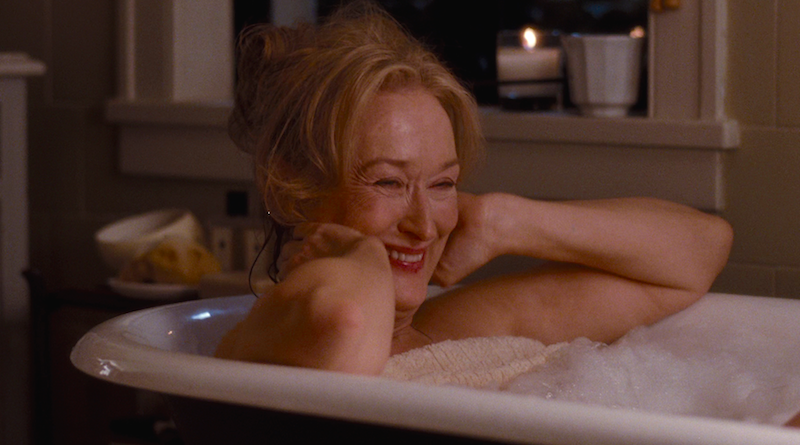
What else stands out for you about one of Streep’s rare romantic comedies?
JOHN: It’s Complicated is not a terrible film, by any means, but you accurately describe the sometimes patchy and contrived scenarios that Streep must deftly piece together. She does this by barreling forward with tremendous energy in both her dramatic and comic moments, maneuvering the two strains in her script with expert panache. Streep conveys Jane’s loneliness in remarkably subtle ways: meekly but firmly announcing, “Adler, party of one,” upon entering a hotel restaurant solo; insisting to Martin that she doesn’t want his-and-hers sinks; and later, being stood up and humiliated by Baldwin after preparing an ornate meal, proceeding to take off her earrings, close all the lights, and slink away to bed. When Jane finally decides to let Jake see her naked, Streep slowly unfurls her bathrobe, sustaining his eye contact with an expression as vulnerable and delicate as she has ever been on screen. In these moments, Streep raises the emotional stakes of a film that would have been equally content to forget them.
But as Jane remarks to Adam after an exciting evening at her son’s graduation party, fun is not overrated, is it? Streep is evidently having the time of her life hanging out with her gals, cooking delicious-looking meals (lavender ice cream!), and getting her freak on with uncontained glee. Who else but Streep could utter the lines, “I’m a bit of a slut,” or “I prefer a lot of semen — always have,” with such cheeky, outrageous conviction? And then there’s the “smot poking” sequence, a nonstop howler that is at once a completely ludicrous rendering of being high but is nonetheless pure joy to watch, especially when Streep remarks on Martin’s “insane dashboard cockpit” or admits that she’s “feeling a little fan-tastic!” She should feel fantastic; Streep whips up a frothy and formidable performance in It’s Complicated, a treat to savor for years to come.
